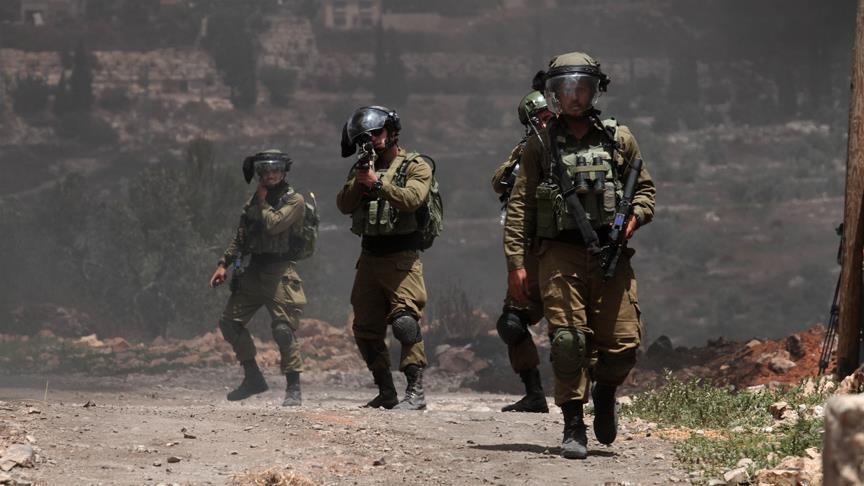Israel embroiled at 3 fronts amid severe internal disputes
‘We are in midst of events that could escalate into war,’ says former head of Israeli military intelligence

JERUSALEM
Syria has become, after the Gaza Strip and Lebanon, the third front from which militants launch rockets toward Israel.
Syria is no stranger to the Israeli Air Force, which has carried out hundreds of raids over the past years on what Israel says are targets of Iran and the Lebanese Hezbollah group.
Israel hesitated to respond to 34 missiles launched from Lebanon on Thursday. However, it rushed to attack sites in Syria, a few hours after a six-missile attack was launched toward its territories.
Analysts in Israel agree that the rocket fire, whether from Gaza, Lebanon, or Syria, comes in response to incursions by the Israeli police and settlers into Al-Aqsa Mosque during the month of Ramadan.
3 fronts, internal crisis
Israel facing three fronts at a time when the country is witnessing severe internal disputes represents an unprecedented situation in its history.
For its part, the Israeli Ministry of Defense announced in a statement on Saturday that Defense Minister Yoav Gallant instructed the defense establishment to allocate resources and troops to enhance surveillance.
Amos Yadlin, the former head of Israel's Military Intelligence Directorate (Aman), said that “the security events are not over - we are in the midst of them and they can escalate to the point of an operation/round/war.”
Yadlin said in a series of tweets on Sunday that "there are 3 dilemmas facing decision-makers."
"First: Is the security event in which we are Palestinian - multi-scene single-organization - or is it an event in which the entire radical axis, which runs from Iran through Hezbollah to Hamas, participates?
Second: Has Israeli deterrence been eroded to a level that requires action to restore it or is the policy of containment that Israel is pursuing correct?
Third: What is the strategy required to restore Israeli deterrence without escalating into a full-fledged conflict in the south, and especially in the north?"
Yadlin stated that “although the ‘generator’ of the crisis is the Temple Mount, and the rocket launchers from Gaza and the north are Palestinian, this is not a sole "Palestinian incident.” Rather a multi-arena event.”
He warned that “the escalation potential is not limited to the Palestinian arena alone. It is hard to assume that an extensive barrage of rockets from southern Lebanon was launched without Hezbollah's knowledge.”
Yadlin stated that “the shooting from Syria is also from the Al-Quds Brigade operated by the Syrian regime, with the support of Iran and Hezbollah.”
He added that “Israeli deterrence has eroded due to the enemy's assessment that Israel has weakened due to the internal rift, its relations with the US in crisis, and Israel itself fears war.”
“However, it is important to distinguish between Israeli ‘strategic’ deterrence, which is still very strong, and our enemy's assessment that the level of provocation has risen significantly,” he added.
Yadlin said that the secretary-general of Hezbollah, Hassan Nasrallah, “sees the escalation with Israel as a calculated risk, which is right to take because in his view Israel in its situation will not risk war. This is a classic recipe for miscalculation, which Nasrallah already suffered in 2006.”
Yadlin pointed out that "the first and most urgent step, which will most immediately restore Israel's image … is to stop the legal reform.”
According to Yaldin, Netanyahu should announce that any change in the government will only be by broad agreement.
This move will “enable an immediate improvement of relations with Washington.”
He stated that subsequently, “Israel will be required to take a series of moves, including on the operational and military level … in order to restore our deterrence capacity.”
“A hot summer awaits us, it is important that we enter it with a clear and cool head,” said Yadlin.
Al-Aqsa events
Yair Lapid, the opposition leader and former Israeli prime minister, held the current government responsible for the events in Al-Aqsa Mosque.
Lapid said in an interview with the official Israeli Broadcasting Authority, KAN: "The events in the Temple Mount are due to the government's irresponsibility.”
This is the result of entrusting the government to the most extremist men in the State of Israel, according to Lapid.
“Ben Gvir is only trying to ignite the Middle East,” he added.
Tamir Hayman, the former head of the Military Intelligence Division in the Israeli army, said in a series of tweets that Israel is “in the midst of a consolidation of geographic arenas.”
Hayman said, “the heart of the current situation is the Palestinian arena, with an emphasis on the Temple Mount.”
“As with the Wall Guard [operation carried out by Israel against the Gaza Strip in 2021], it is the Temple Mount effect that activates the Palestinian resistance in all arenas - Israeli Arabs, Gaza, and Palestinian organizations in the north,” he added.
According to Hayman, Hamas prepared a firing infrastructure in Lebanon and fired as soon as it saw the pictures from the Temple Mount.
“Hezbollah was not the initiator, and probably didn't know about it,” he added.
He further said: "Palestinian elements from the Syrian Golan Heights fired.”
Hayman considered the latest events “a multi-sector Palestinian event, and not an event of Iran and its network of militias.”
Violence escalated across the Palestinian territories after Israeli police last week forcibly removed worshippers from inside the Al-Aqsa Mosque complex.
The Israeli raids on the mosque triggered rocket fire from the Gaza Strip and Lebanon, with Israeli retaliating with air and artillery shelling.
*Ikram Kouachi in Ankara contributed to this report.
Anadolu Agency website contains only a portion of the news stories offered to subscribers in the AA News Broadcasting System (HAS), and in summarized form. Please contact us for subscription options.








